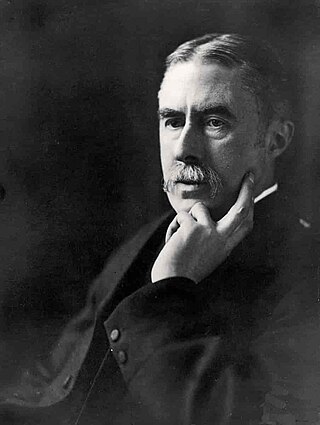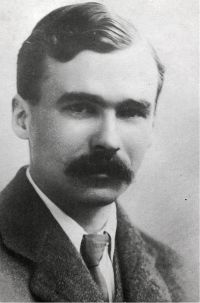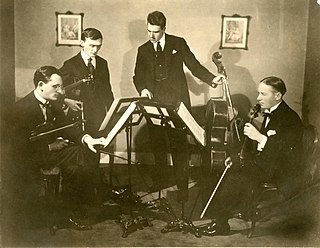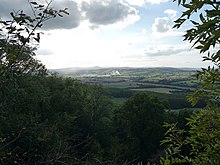
Alfred Edward Housman was an English classical scholar and poet. After an initially poor performance while at university, he took employment as a clerk in London and established his academic reputation by publishing as a private scholar at first. Later Housman was appointed Professor of Latin at University College London and then at the University of Cambridge. He is now acknowledged as one of the foremost classicists of his age and has been ranked as one of the greatest scholars of any time. His editions of Juvenal, Manilius, and Lucan are still considered authoritative.

George Sainton Kaye Butterworth, MC was an English composer who was best known for the orchestral idyll The Banks of Green Willow and his song settings of A. E. Housman's poems from A Shropshire Lad.
A Shropshire Lad is a collection of sixty-three poems by the English poet Alfred Edward Housman, published in 1896. Selling slowly at first, it then rapidly grew in popularity, particularly among young readers. Composers began setting the poems to music less than ten years after their first appearance, and many parodists have satirised Housman's themes and poetic style.

Much Wenlock is a market town and parish in Shropshire, England, situated on the A458 road between Shrewsbury and Bridgnorth. Nearby, to the northeast, is the Ironbridge Gorge and Telford. The civil parish includes the villages of Homer, Wyke, Atterley, Stretton Westwood and Bourton. The population of the civil parish, according to the 2001 census, was 2,605, increasing to 2,877 at the 2011 Census.

Sir Arthur Somervell was an English composer and educationalist. After Hubert Parry, he was one of the most successful and influential writers of art song in the English music renaissance of the 1890s–1900s. According to Michael Hurd, his most important work is found in the five song cycles, particularly his settings of Tennyson in Maud (1898) and Housman in A Shropshire Lad (1904).

Wenlock Edge is a limestone escarpment near Much Wenlock, Shropshire, England and a site of special scientific interest because of its geology. It is over 19 miles (31 km) long, running southwest to northeast between Craven Arms and Much Wenlock, and is roughly 1,083 feet above sea level. The deciduous woodland which runs along it covers much of the steep slopes of the escarpment and in parts it is very well preserved.

Bredon Hill is a hill in Worcestershire, England, south-west of Evesham in the Vale of Evesham. The summit of the hill is in the parish of Kemerton, and it extends over parts of eight other parishes. The hill is geologically part of the Cotswolds and lies within the Cotswolds Area of Outstanding Natural Beauty. However, it now stands isolated in the Vale of Evesham due to natural causes.
Last Poems (1922) was the last of the two volumes of poems which A. E. Housman published during his lifetime. Of the 42 poems there, seventeen were given titles, a greater proportion than in his previous collection, A Shropshire Lad (1896). Although it was not quite so popular with composers, the majority of the poems there have been set to music.

Gervase Henry Cary-Elwes, DL, better known as Gervase Elwes, was an English tenor of great distinction, who exercised a powerful influence over the development of English music from the early 1900s up until his death in 1921 due to a railroad accident in Boston at the height of his career.
James Campbell McInnes was a well-known English baritone singer and teacher at the turn of the 20th century, ex-husband of author Angela Thirkell and father of writer Colin MacInnes.
"Is My Team Ploughing" is a poem by A. E. Housman, published as number XXVII in his 1896 collection A Shropshire Lad. It is a conversation between a dead man and his still living friend. Toward the end of the poem it is implied that the friend is now with the girl left behind when the narrator died. In writing the poem, Housman borrows from the simple style of traditional folk ballads, featuring a question-and-answer format in a conversation.
Charles Wilfred Leslie Orr, generally known as C. W. Orr, was an English composer. He is particularly noted for his songs, though his output was small. He wrote only 35 songs in 82 years, 24 of them setting words by A. E. Housman.

The London String Quartet was a string quartet founded in London in 1908 which remained one of the leading English chamber groups into the 1930s, and made several well-known recordings.
Frederick B. Kiddle was a prominent English pianist, organist and accompanist.
Six Songs from A Shropshire Lad is a song cycle for baritone and piano composed in 1911 by George Butterworth (1885–1916). It consists of settings of six poems from A. E. Housman's 1896 collection A Shropshire Lad.
Bredon Hill and Other Songs is a song cycle for baritone and piano composed by George Butterworth (1885–1916) in 1912. It sets five poems from A. E. Housman's 1896 collection A Shropshire Lad.
The Land of Lost Content is a song cycle for voice and piano composed in 1920–21 by John Ireland (1879–1962). It consists of settings of six poems by A. E. Housman from his 1896 collection A Shropshire Lad.
By Footpath and Stile is a song cycle for baritone and string quartet by English composer Gerald Finzi (1901-1956) set to poems by Thomas Hardy (1840-1928). Composed between 1921 and 1922, it was first performed in 1923 and published in 1925.








